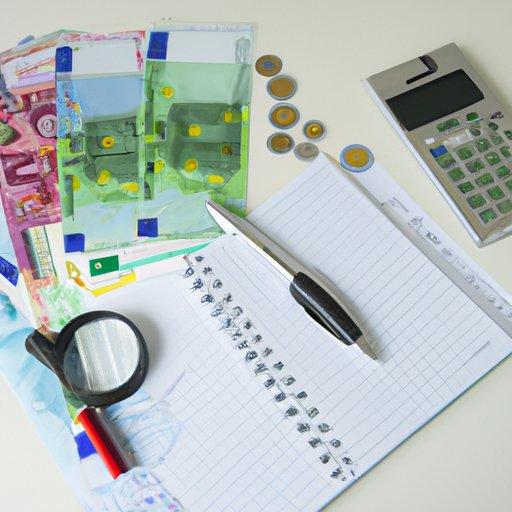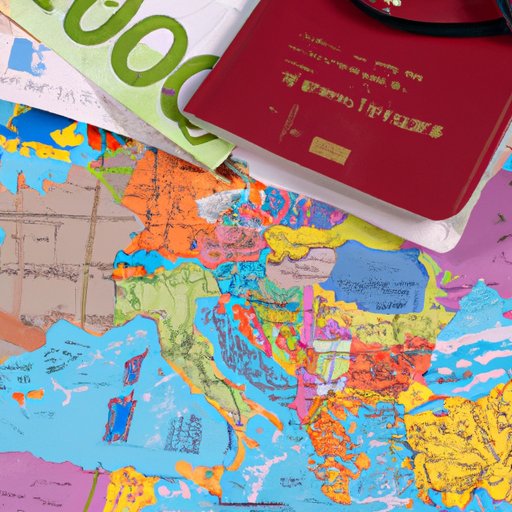Introduction
Planning a trip to Europe is an exciting prospect. From the cobblestone streets of Paris to the canals of Amsterdam and the stunning beaches of Greece, Europe has something for everyone. Whether you’re planning a week-long vacation or a month-long exploration of the continent, it’s important to know how much money you’ll need before you go. This article will explore the cost of traveling in Europe and provide tips on how to save and make money while exploring the continent.

Calculating Your Budget for a Trip Through Europe
Estimating your overall budget for a trip to Europe can be daunting, but it doesn’t have to be. By considering all of the variables that go into calculating a budget, you can get a better sense of what you’ll need to save up before you go. The cost of a European vacation can vary greatly depending on the length of your stay, the countries you visit, and the type of accommodations you choose. Here are some of the variables to consider when calculating your budget:
- Length of stay: How long will you be in Europe? A week-long vacation will require less money than a longer trip.
- Countries visited: Each country in Europe has its own cost of living, so it’s important to factor in the cost of living in each country you plan to visit.
- Type of accommodations: Will you be staying in hotels, hostels, Airbnb, or camping? Different types of accommodations can range from budget-friendly to luxury.
- Transportation: How will you get around? Will you be taking buses, trains, or planes?
- Food: Where will you eat? Will you be eating out or cooking at home?
- Attractions: What activities do you want to do? Are there any special attractions or events you’d like to attend?
Below are some examples of typical costs associated with traveling in Europe:
- Airfare: Depending on where you’re flying from, airfare to Europe can range from $300-$1,000 round-trip.
- Transportation: Public transportation, such as buses and trains, can range from $10-$50 per day.
- Accommodations: Hostels can range from $15-$30 per night, while hotels can range from $50-$200 per night.
- Food: Eating out can range from $15-$50 per day, while groceries can cost anywhere from $5-$20 per day.
- Attractions: Museums and other attractions can range from free to $25+ per person.
What You Need to Know Before Traveling Europe on a Budget
Before you start planning your European vacation, it’s important to understand the cost of living in different countries in Europe. While some countries are more expensive than others, there are ways to stretch your budget and make the most of your money. Here are some things to consider before traveling Europe on a budget:
- Different methods of transportation: Depending on where you’re going, there are different methods of transportation available. From trains and buses to rideshares and ferries, there are many ways to get around Europe. Researching different options ahead of time can help you find the most affordable option.
- Researching accommodations and attractions: Researching accommodations and attractions ahead of time can help you find the best deals. Looking for discounts and rewards programs can also help you save money.

How to Save Money for Your European Adventure
Saving money for a European vacation can be challenging, but there are ways to make it easier. Setting up a savings plan and exploring ways to earn money before you go can help you reach your travel goals. Here are some tips for saving money for your European adventure:
- Setting up a savings plan: Setting up a savings plan can help you reach your goal of traveling to Europe. Consider setting aside a certain amount of money each month, or look into setting up an automatic transfer from your checking account to a savings account.
- Exploring ways to earn money before you go: There are many ways to make extra money before you go. Look into freelance opportunities, such as writing or graphic design, or consider picking up a part-time job.
- Utilizing discounts and rewards programs: Many companies offer discounts and rewards programs for travelers. Research different companies and see if they offer any discounts or rewards programs that you can take advantage of.
Tips for Saving and Making Money While Exploring Europe
While traveling in Europe, there are many ways to save money and even make some extra cash. Taking advantage of free or low-cost activities, finding affordable meals and snacks, and looking for alternative forms of transportation can all help you save money. Here are some tips for saving and making money while exploring Europe:
- Taking advantage of free or low-cost activities: Many cities in Europe offer free or low-cost activities. Look into walking tours, museum discounts, and other activities that won’t break the bank.
- Finding affordable meals and snacks: Eating out can be expensive, but there are ways to save money. Look into grocery stores and markets for cheaper meals and snacks, or consider packing your own lunch.
- Looking for alternative forms of transportation: If you’re trying to save money, consider using alternative forms of transportation. Walking, biking, and ridesharing can be cheaper than public transportation.

Five Things to Consider When Planning a Trip to Europe
When planning your trip to Europe, there are a few things to keep in mind. Here are five things to consider when planning a trip to Europe:
- Finding the best exchange rate: Knowing the exchange rate of the currency in the country you’re visiting can help you save money. Research different banks and credit cards to find the best exchange rate.
- Staying safe while abroad: Safety should always be a top priority when traveling abroad. Research the area you’ll be visiting and familiarize yourself with local laws and customs.
- Knowing what items to bring: Packing light is key when traveling to Europe. Think about what items you really need and leave anything unnecessary at home.
- Learning the language: Learning some basic phrases in the language of the country you’re visiting can be helpful. It’s also a great way to meet locals and learn more about the culture.
- Being aware of cultural differences: Every country has its own unique culture and customs. Researching the culture and customs of the country you’re visiting can help you avoid any potential misunderstandings.
Estimating the Cost of a European Vacation
Once you’ve taken into account all of the variables mentioned above, you can estimate the cost of a European vacation. Here are some tips for estimating the cost of a European vacation:
- Estimating airfare: Airfare will likely be one of the biggest expenses for your trip. Shop around for the best deals and consider flying into different airports to save money.
- Estimating transportation costs: Depending on the countries you visit, transportation costs can vary. Research different transportation options and look for discounts or rewards programs.
- Estimating food costs: Food costs can add up quickly, so it’s important to plan ahead. Look into grocery stores and markets for cheaper meals and snacks.
- Estimating accommodation costs: Accommodation costs can range from budget-friendly to luxury. Research different options and compare prices to find the best deal.
- Estimating entertainment costs: Attractions and other activities can add up quickly. Look into discounts and rewards programs to save money.
Conclusion
Travelling to Europe can be an unforgettable experience, but it’s important to know how much money you’ll need before you go. By considering all of the variables that go into calculating a budget, you can get a better sense of what you’ll need to save up before you go. Utilizing discounts and rewards programs, researching different transportation options, and finding affordable meals and snacks can all help you save money. With a little bit of planning and preparation, you can have an amazing European vacation without breaking the bank.
(Note: Is this article not meeting your expectations? Do you have knowledge or insights to share? Unlock new opportunities and expand your reach by joining our authors team. Click Registration to join us and share your expertise with our readers.)
